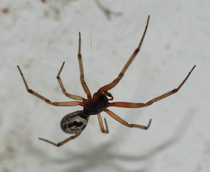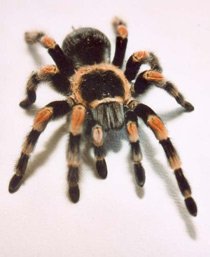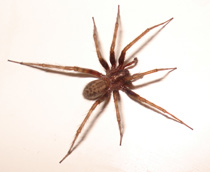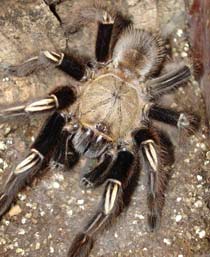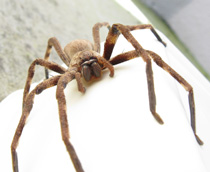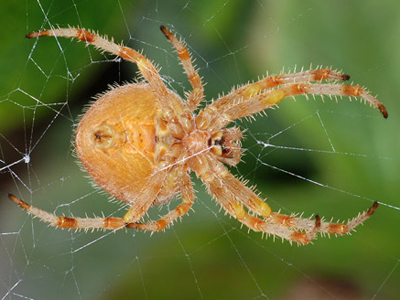
Can you tell what it is?
Insects and Spiders - Spiders
Not only do spiders have eight legs, most species have eight eyes too! Did you know that spiders taste with their feet? Because their mouths are small, they inject a deadly poison into their victims. The poison turns the insides of the victims to mush. Therefore the spider can drink the mush and leave the empty shell.
If you wish to see the spiders in more detail, just click on the photo.
To see a larger image, click on the picture.
1 .
Can you identify this spider?
Skeleton tarantula
Mexican red-knee tarantula
Giant house spider
Biting spider
- Order: Araneae
- Family: Agelenidae
- Genus: Tegenaria
- Species: T. duellica
- Females grow up to 18 mm in length. The leg span of the male can reach 75 mm!
- This species is able to bite right through human skin.
- Legs and stomach are hairy enough to notice.
2 .
Can you identify this spider?
Great raft spider
False widow
European garden spider
Sydney funnel-web spider
- Order: Araneae
- Family: Theridiidae
- Genus: Steatoda
- Species: S. nobilis
- Normally located indoors or in outhouses.
- The web is rather untidy and irregular.
- First recorded in the UK back in 1879 and has been here ever since.
3 .
Can you identify this spider?
Cave spider
Zebra spider
Hobo spider
Water spider
- Order: Araneae
- Family: Tetragnathidae
- Genus: Meta
- Species: M. menardi
- Their habitat is in dark places, such as cellars and tunnels.
- One of the largest UK spiders.
- The spiderlings are attracted to light unlike the adults which are repelled by light.
4 .
Can you identify this spider?
Domestic house spider
Huntsman spider
Wasp spider
Mexican red-knee tarantula
- Order: Araneae
- Family: Theraphosidae
- Genus: Brachypelma
- Species: B. smithi
- One of the most popular spider pets.
- The species has been used in films as a frightener.
- Females can live up to 30 years - unusual in a spider.
- It is calm and gentle-natured, despite its appearance.
5 .
Can you identify this spider?
Hobo spider
Zebra spider
Domestic house spider
Huntsman spider
- Order: Araneae
- Family: Agelenidae
- Genus: Tegenaria
- Species: T. domestica
- These are often seen in bathtubs or hurrying across the room.
- Mainly seen in autumn during their mating season.
- Can survive for several months without food or water.
- A long-legged species.
6 .
Can you identify this spider?
Biting spider
Zebra spider
Common house spider
Skeleton tarantula
- Order: Araneae
- Family: Theraphosidae
- Genus: Ephebopus
- Species: E. murinus
- A South American spider found on tropical forest floors.
- An aggressive spider who will not hesitate to show an attacking pose if threatened.
- It eats insects, worms and small mammals.
7 .
Can you identify this spider?
European garden spider
Giant house spider
Dewdrop spider
Skeleton tarantula
- Order: Araneae
- Family: Araneidae
- Genus: Araneus
- Species: A. diadematus
- Can be spotted mainly in the later months of September and October.
- Female tends to be upside-down in the centre of her circular web.
- They eat their webs at night and build a new one in the morning.
8 .
Can you identify this spider?
Sydney funnel-web spider
Cave spider
Zebra spider
Water spider
- Order: Araneae
- Family: Salticidae
- Genus: Salticus
- Species: S. scenicus
- A jumping spider that catches prey by leaping on it.
- Despite being only a few millimetres long, they are capable of leaps up to 100 mm!
- This species is unusual in that they appear to be aware of humans.
9 .
Can you identify this spider?
Water spider
Dewdrop spider
Hobo spider
Cave spider
- Order: Araneae
- Family: Cybaeidae
- Genus: Argyroneta
- Species: A. aquatica
- Also called the diving bell spider.
- A good swimmer that builds its web under water.
- The male is larger than the female.
- These spiders are eaten by frogs and fish.
10 .
Can you identify this spider?
Huntsman spider
Sydney funnel-web spider
Great raft spider
European garden spider
- Order: Araneae
- Section: Entelegynae
- Superfamily: Sparassoidea
- Family: Sparassidae
- Found in almost all tropical regions of the world.
- A huge spider which can measure 15 cm from leg to leg!
- They do not build webs and catch their prey with speed.
- Generally not harmful to humans but will bite if provoked.
**Unlimited Quizzes Await You! 🚀**
Hey there, quiz champ! 🌟 You've already tackled today's free questions.
Ready for more?
Ready for more?
🔓 Unlock UNLIMITED Quizzes and challenge yourself every day. But that's
not all...
not all...
🔥 As a Subscriber you can join our thrilling "Daily Streak" against other
quizzers. Try to win a coveted spot on our Hall of Fame Page.
quizzers. Try to win a coveted spot on our Hall of Fame Page.
Don't miss out! Join us now and keep the fun rolling. 🎉
**Unlimited Quizzes Await You! 🚀**
Hey there, quiz champ! 🌟 You've already tackled today's free questions. Ready for more?
🔓 Unlock UNLIMITED Quizzes and challenge yourself every day. But that's not all...
🔥 As a Subscriber you can join our thrilling "Daily Streak" against other quizzers. Try to win a coveted spot on our Hall of Fame Page.
Don't miss out! Join us now and keep the fun rolling. 🎉






